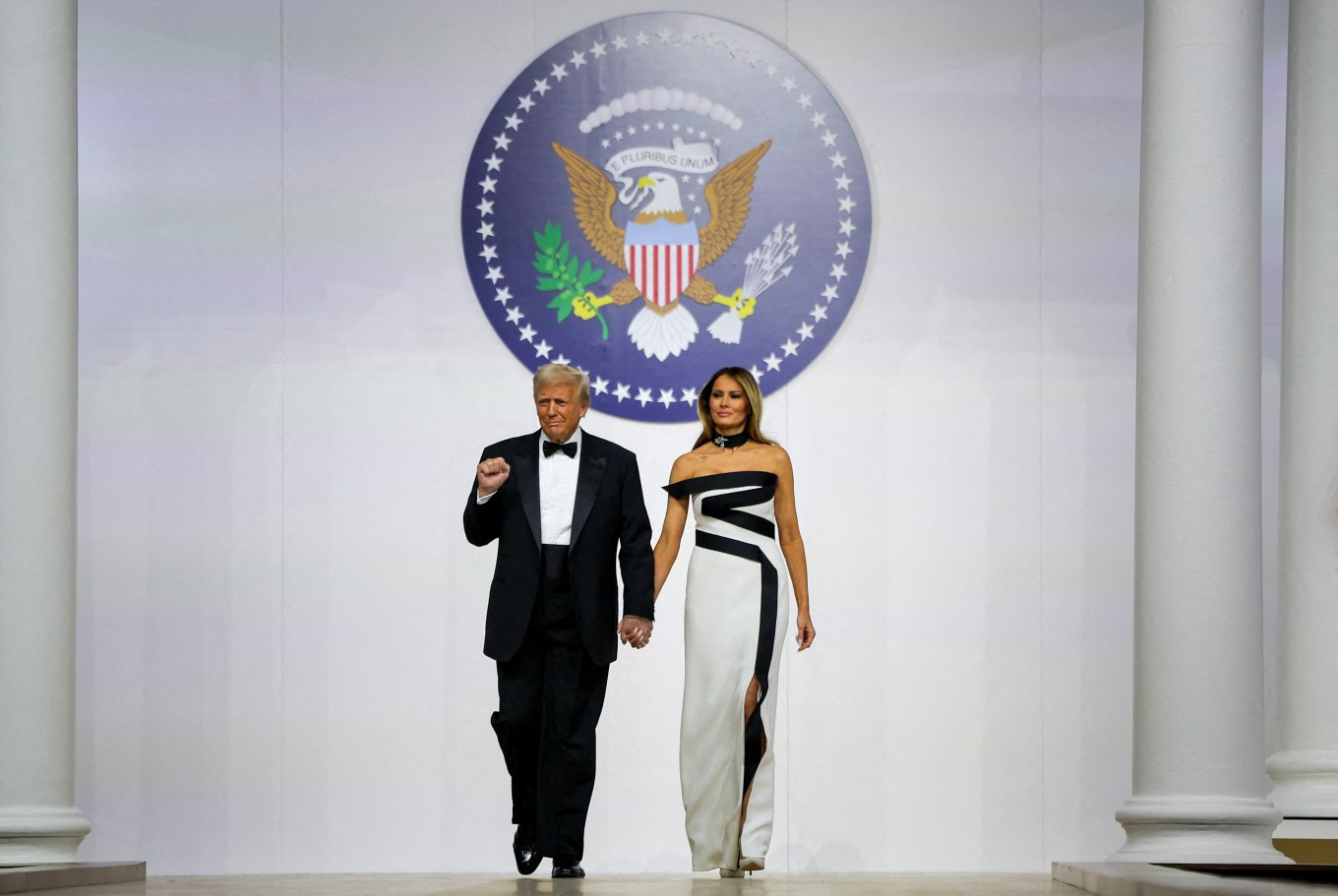News
Tariff deal puts Indonesia on Trump’s good side, for now
Tenggara Strategics July 30, 2025 United States President Donald Trump and First Lady Melania Trump attend the Commander in Chief Ball on Jan. 20, 2025, one of three balls held in Washington, DC, in honor of his inauguration as the 47th US president. (Reuters/Carlos Barria)
United States President Donald Trump and First Lady Melania Trump attend the Commander in Chief Ball on Jan. 20, 2025, one of three balls held in Washington, DC, in honor of his inauguration as the 47th US president. (Reuters/Carlos Barria)
The deal on tariffs between Indonesia and the United States, as announced by President Donald Trump last week, has put Indonesia on the good side of Washington, shifting its position in the current big power rivalry away from China, at least momentarily.
For the last decade or so, Indonesia has been widely perceived to be leaning closer to China, some would say too close for comfort, that any shift away now would be welcomed in some quarters who are worried about Jakarta becoming too dependent, certainly economically, on the Asian giant that could undermine its claim to non-alignment.
When President Prabowo Subianto took over the helm in October, he further pushed Jakarta closer to Beijing, first by joining BRICS, an alliance of emerging economies that include China and Russia; and second, by making high-profile visits to Beijing and Moscow. He even had the audacity to turn down an invitation to attend the Group of Seven (G7) summit of Western major powers in Canada as a special guest in June, choosing to visit Russia instead.
In his posting on his Truth Social media on July 16, Trump said that following his phone conversation with Prabowo, the two had struck a “great deal” over tariffs. But now that more details of the agreement have emerged, as provided by the US government, Indonesia may have given away too much.
Responding to critics, Prabowo said he had the national interest in mind, including protecting jobs at home, in the negotiations with Trump. He also said he was safeguarding Indonesia’s non-alignment status by striking the deal.
The deal means Indonesian exports to the US will be subject to a 19 percent tariff while all US exports, which include goods and services, into Indonesia will face zero tariffs. Jakarta has also pledged to remove all non-tariff barriers for US imports and to spend huge sums on US-made planes, agricultural products, and energy.
The agreement followed intensive negotiations going back to April when Trump threatened to impose a 32 percent tariff on all Indonesian exports, the rate which he calculated was necessary to cut the huge trade deficit with Indonesia, estimated at over US$18 billion in 2024.
The government has yet to explain the implications for the economy, including job gains and losses, but officials said the deal was better than the 20 percent that Vietnam got. The Philippines got 19 percent during the visit of President Ferdinand Marcos Jr. to Washington on July 24. In Southeast Asia, only Singapore had the better deal, with 10 percent.
It is not clear from any statement from either the Indonesian or the US governments whether Trump will impose an additional 10 percent tariff on any country that joined BRICS, which has been campaigning to reform the US-dominated global financial system and to reduce international trade’s dependency on the US dollar.
Indonesia joined BRICS in January and Prabowo made his debut at the group’s summit in Brazil earlier this month.
Indonesia applied to join the Organisation for Economic Co-operation and Development (OECD), a grouping of primarily wealthy industrial countries, before its decision to join BRICS. But while admission to BRICS was automatic, at least for Indonesia, accession to the OECD must go through a lengthy process requiring the government to adjust some of its policies.
The US is Indonesia’s second-largest export market after China, and more importantly, the exports include footwear, textiles, and electronics that employ hundreds of thousands of workers, as well as semi-processed raw materials, including crude palm oil.
It remains to be seen whether or not the tariff deal will actually shift Indonesia’s position closer to the center between the US and China. Much depends on the realization of the agreements and their implementation.
Many had assumed before his October inauguration that, given his military background, Prabowo would shift Indonesia closer to the US. As defense minister in 2019-2024 under president Joko “Jokowi” Widodo, he saw Indonesia engaging in more security cooperation with the US than with China, putting the brake on Indonesia from tilting too far toward China.
But Prabowo had also been blacklisted from visiting the US because of the poor human rights record of the Army’s Special Forces, which he commanded in the 1990s. The ban was only lifted when he became defense minister in 2019.
Where Indonesia-US relations are heading will become clearer when Prabowo visits Trump in the White House, currently scheduled for September.
What we've heard
A source said that Prabowo engaged in talks with Trump without being accompanied by technical ministers who understood trade and economic matters. As a result, Indonesia did not gain sufficient benefits from the new trade agreement. "Many details were left undiscussed, putting us at a disadvantage," the source said.

